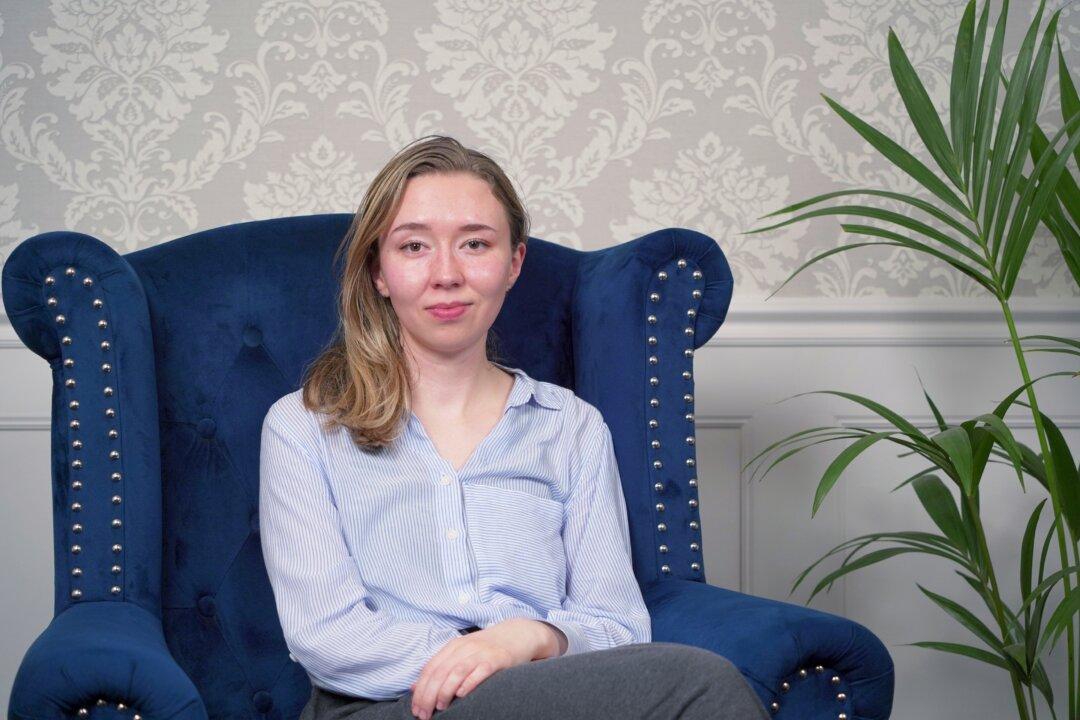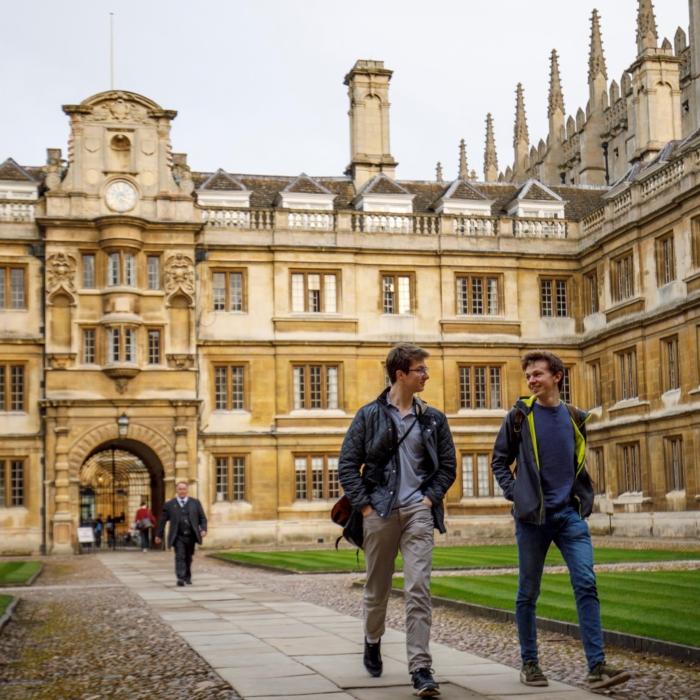University students have had to be smuggled into events and form secret societies to engage with ideas, according to Charlie Bentley-Astor.
The writer, who graduated from the University of Cambridge last year, spoke to NTD’s “British Thought Leaders” programme about her stint as a spy.
According to Ms. Bentley-Astor, she observed in real time how activists knowingly trumped up charges against a college faculty that advertised an event she had organised so it would be scared into apologising.
When a speaker who’s considered controversial by progressive activists is invited to a university, cancellation efforts would begin both publicly and in private chat rooms, Ms. Bentley-Astor said.
Describing what typically happens in public, she said a student would complain on social media, then another student pipes up, epithets such as “bigots” or “Nazis” get thrown around, letter-writing campaigns organised by the LGBT society and others would be mounted, with the expectation that the college would “get startled, back down, give an apology, and cancel the talk.”
According to Ms. Bentley-Astor, student newspapers, which are “always sympathetic to the protesters rather than the speakers,” would also publish “a spate of articles decrying the speaker and sort of alluding to the idea that anyone who goes is, in fact, inculcated in all their views, and therefore is also a bigot, and a transphobic, and a homophobe, and all the rest of it.”
Meanwhile, protests would be organised in private online group chats, some of which Ms. Bentley-Astor, armed with her multiple sim cards, managed to infiltrate.
“... I could be in these group chats to see what was being said, and what was being planned, and the style of the protests, and how many people, and where and when,” she said.
“And I would take that information and usually go to the organisers of these events and going: ‘Look, you’re gonna need this, this, and this, because they’re planning this, this, and this.’”
Ms. Bentley-Astor said the preparations could involve asking a college to organise additional porters, fundraising for private security, and arrange back entrances for people to go through.
“Because a lot of these protests will gather at the entrance of the venue and either block the entrance or basically create a corridor to the entrance so that you have to walk through 100 to 150 people with placards screaming in your face to get into these venues,” she said.
During the events, protesters would “use megaphones, bull horns, pots and pans, drums, and just try to drown you out for the next three hours. It’s relentless,” she said.
Ms. Bentley-Astor described a brief moment during a Q&A session with gender-critical journalist and author Helen Joyce when people could “hear the mob coming.”
“That was quite an intimidating night because you can hear this protest of 150 people getting nearer and nearer as people are trying to talk louder and louder over them. And they got right outside the door.”
Chilling Effect
Ms. Bentley-Astor outlined the chilling effects the environment has had on academics and students.Students are most concerned about “social ostracism and career impeachment,” she said, adding that professors can easily be subject to a safeguarding investigation.
Ms. Bentley-Astor said professors have been under months-long investigations, after which they had always been cleared of all charges, but another investigation would follow if they are spotted at another event or if they speak out against the cancellation attempts.
Fearing repercussions for attending certain events, students either “don’t go to these events or will go ahead of time,” she said.
According to Ms. Bentley-Astor, one of the ways she had been using to help audiences is to set up waiting rooms where people can arrive “hours before the thing starts” so they won’t be seen coming and going by protesters.
‘Trumped-up Charge’
In 2023, Ms. Bentley-Astor invited data scientist and demographer Stephen Shaw for a screening of his documentary “Birthgap” at St. John’s College, University of Cambridge.Ms. Bentley-Astor said activists decided to protest the event, without knowing what it’s actually about, because of her views on transgenderism and because Mr. Shaw had appeared on the podcast hosted by Canadian psychologist Jordan Peterson—one of the most prominent opponents to the transgender ideology and public policies related to it.
“So it’s another one of these politics by cooties kind of thing,” she said.
“He had had a personal connection with both of us, and so, by the same extent, he must be sympathetic towards our views. Therefore, if I’m transphobic, and Jordan Peterson is transphobic, then he must be transphobic. And this must be a transphobic film, even though none of the students had watched the film before they mounted the protest.”
Having embedded herself in a group chat where people plotted how to cancel her film screening event, Ms. Bentley-Astor saw how activists made up accusations, she said.
Ms. Bentley-Astor had asked college faculties, including the natural sciences department, to include information about the screening of Birthgap in their mailing lists, and she said students decided they were going to attack the department.
“And they said that what they were going to accuse the faculty of doing was promoting eugenics, even though they knew it wasn’t true,” she said.
“They were saying in this chat that they kind of know this is a trumped up charge that’s founded upon nothing, but it would scare the faculty enough into apologising.”
The sad thing, Ms. Bentley-Astor said, is that there was just “a handful of ringleaders who concoct these ideas and these strategies,” and the followers “genuinely believe that if they have a trans identity, that the world is out to get them, that the world is trying to stop them from being their ’true self,' to stop them being who they want to be and expressing themselves.
“They genuinely believe that. And I can say that from my own perspective of having been very left wing, radically left wing.
“I believed the whole world was out to get me, because I was being told by people who I looked up to, who were more powerful than me, that the world was out to get me.”
Ms. Bentley-Astor previously wrote about her experience of being convinced she could choose to be a “non-gendered human.” She went as far as asking for the removal of her female organs, and only started challenging her belief after a GP, who she said may have saved her life, turned her away instead of referring her to have surgeries.
Ms. Bentley-Astor also said the college took an unusual step of making her responsible for managing the protesters during the event, and the organisers refused to cooperate.
She described how she outed herself in the chat group, told the protesters that she had defended their right to protest, and invited them to join the event and confront her and the filmmaker if they wish. In exchange, she asked the protesters to “just keeping the noise down.”
The World Won’t End
Ms. Bentley-Astor’s film-screening event was cancelled on the same day the Higher Education (Freedom of Speech) Bill became law.Gearing up for its new power to police the protection of free speech, the Office for Students (OfS) has published draft guidance for universities on what they should and should not do.
The OfS has warned universities against cancelling speaking events, and said they should resist pressure to fire or penalise staff or students over their speech and provide timely support to them.
However, Ms. Bentley-Astor is not too optimistic about how much the new law could help.
She said there were already laws and university rules on free speech, but “the universities don’t want to enforce them in the first place” because they “probably believe that these rules are too much hassle for their own good.”
But she’s hopeful that the law would mean universities would “put in the minor measures” such as having a fund for security so more events can go ahead, and both audiences and protesters can see that “the world doesn’t in fact end” with the occurrence of a debate.
She encouraged protesters to instead “set up your own counter talk,” saying it’s “far more productive than trying to shut down one half of the debate.”
For attendants of events, Ms. Bentley-Astor said she wants them to know that while colleagues may give them “the side eye,” the world “hasn’t ended.
“And once you get outside the other side of the first one, you kind of realise you’re pretty much invincible,” she said.
“And when you get into another one, you know the lay of the land, you know that if you just ... dig down, just keep going, it'll last three days at the worst. And then you come out the other side.”
Speaking from her experience, Ms. Bentley-Astor said “you might have lost a couple of people” who “weren’t meant to be in your life in the first place” because no one in the relationship had been speaking their mind, but new relationship will be formed with like-minded people.








